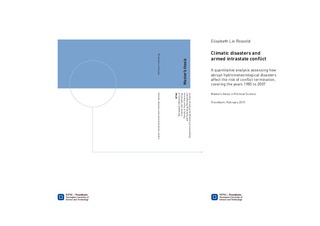| dc.description.abstract | This thesis covers the relatively unstudied connection between hydrometeorological disasters
and the duration of armed intrastate conflict, and aims to discover how abrupt climate
changes affect the prospects for conflict termination. By performing several Weibulldistributed
survival models, it specifically examines the effects of the rapid-onset climatic
disasters floods, windstorms, waves, and extreme temperatures on the risk of conflict
termination. The central hypothesis leans on a number of theoretical arguments holding that
disasters have the capacity to act as catalysts for peace. The results of the analysis do
however indicate that disasters reduce the risk of conflict termination, but with the caveat that
this effect might reverse with time. With somewhat indistinct empirical results, the thesis falls
in line with existing research on the topic arguing that closer, more disaggregated analyses of
the mechanisms at play between climatic disasters and conflict dynamics are in demand. | nb_NO |
